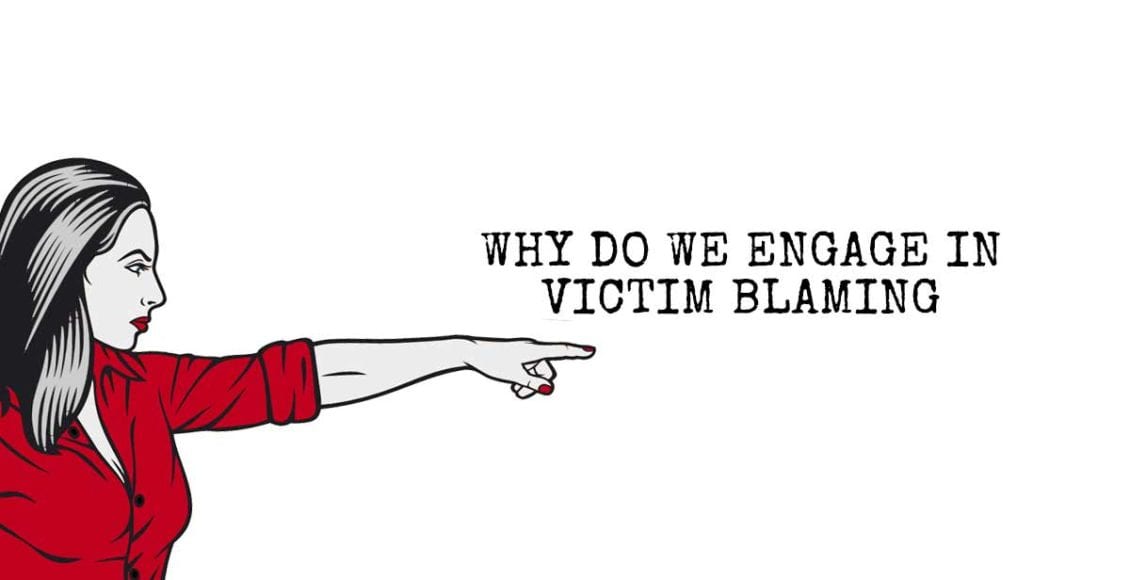Most of us are familiar with the concept of victim blaming.
A woman reports that she was assaulted, and is met with a barrage of questions relating to her own conduct. What was she wearing? How much did she have to drink? Why was she walking alone? Had she been talking to strange men at the bar? Dancing? Showing off? Being provocative? Does she have a history of behaving in a promiscuous way?
And this isn’t exclusive to women – male victims often face this, too.
A teenager claims that he is being cyberbullied, and a similar dynamic takes place. What did he do to make himself such an easy target? Why didn’t he ever stand up for himself? How did he encourage this behavior? Did he dress or act in a way that invited it? Embrace a non-traditional sexual identity? What was he posting on social media? What kind of a parent even let him go online in the first place?
It would seem that as a society, we always have a need to know: What did the victim do to bring this upon themselves?
What we are really asking, however, is: This couldn’t happen to me, could it?
I could never be assaulted, because I don’t dress like that. I would never walk home alone. I’m too careful.
She must be a slut to have allowed that to happen to herself – or at the very least, she must have been behaving very stupidly.
My child would never be bullied like that. We monitor his internet activities very closely.
His parents must be negligent to have let this happen.
We conclude that it was somehow the victim’s own fault – or that they at least contributed to the situation in some way.
What we’re really doing is reassuring ourselves that this could never happen to us, or to our own loved ones.
Some kinds of victim blaming are much less clear cut.
We choose to believe that the poor are poor because of their own laziness, rather than the culmination of more complex social and economic forces. We reference stories of people who pulled themselves up by their bootstraps, with the subtext that others in their situation should be doing the same. We believe that people with depression simply need to change their attitude. Engage in positive thinking. Snap out of it already! Obese people need to simply eat less and exercise more.
We don’t want to own the fact that we may be privileged not to experience these things. If these people behaved just like we do, we reason, they wouldn’t be facing these disadvantages. That’s why they’re struggling while we’re doing just fine.
This lack of compassion doesn’t come from a place of cruelty. It comes from a place of vulnerability.
We don’t want to believe that we are vulnerable to these misfortunes. Sometimes it takes a stroke of bad luck for us to change this toxic and limiting mindset.
A friend is sexually assaulted on her way to the library, wearing a cardigan and not even a hint of make-up. We fall victim to a clinical case of depression that we can’t seem to “just snap out of” as we’d previously thought. Our daughter sends a sexually graphic text message that goes viral around her school. We are prescribed a life saving medication that causes uncontrollable weight gain.
Suddenly these people start to look a lot more like the victims they are – and that unsettles us.
Seeing the world from a victim’s eyes is scary because it means recognizing that the world is not a fair and reasonable place like we’d hoped it would be. Bad things happen to good people. This means that sometimes we and our loved ones will suffer – and that we are powerless to stop it from happening.
Victim blaming is so much easier than facing these cold truths.
So – what can we do about this?
The answer is not to admit powerlessness – quite the opposite. Instead, we need to embrace the power of empathy. Compassion is the harder choice to make in these situations, but it’s also the strongest force of good in a world that is often cruel and callous. As Aysha Taryam wrote, “Viciousness is part of the world we live in, some of us choose to ignore it with the rationalization of wanting only positivity to flow our way. How selfish we have become! That the pain of others has become a hindrance to the fulfilment of our positive selves.” Embrace the pain of other people, even when it hurts to see the world from their point of view. Someday you’ll be a much wiser, stronger, and more complete human being for doing so.


